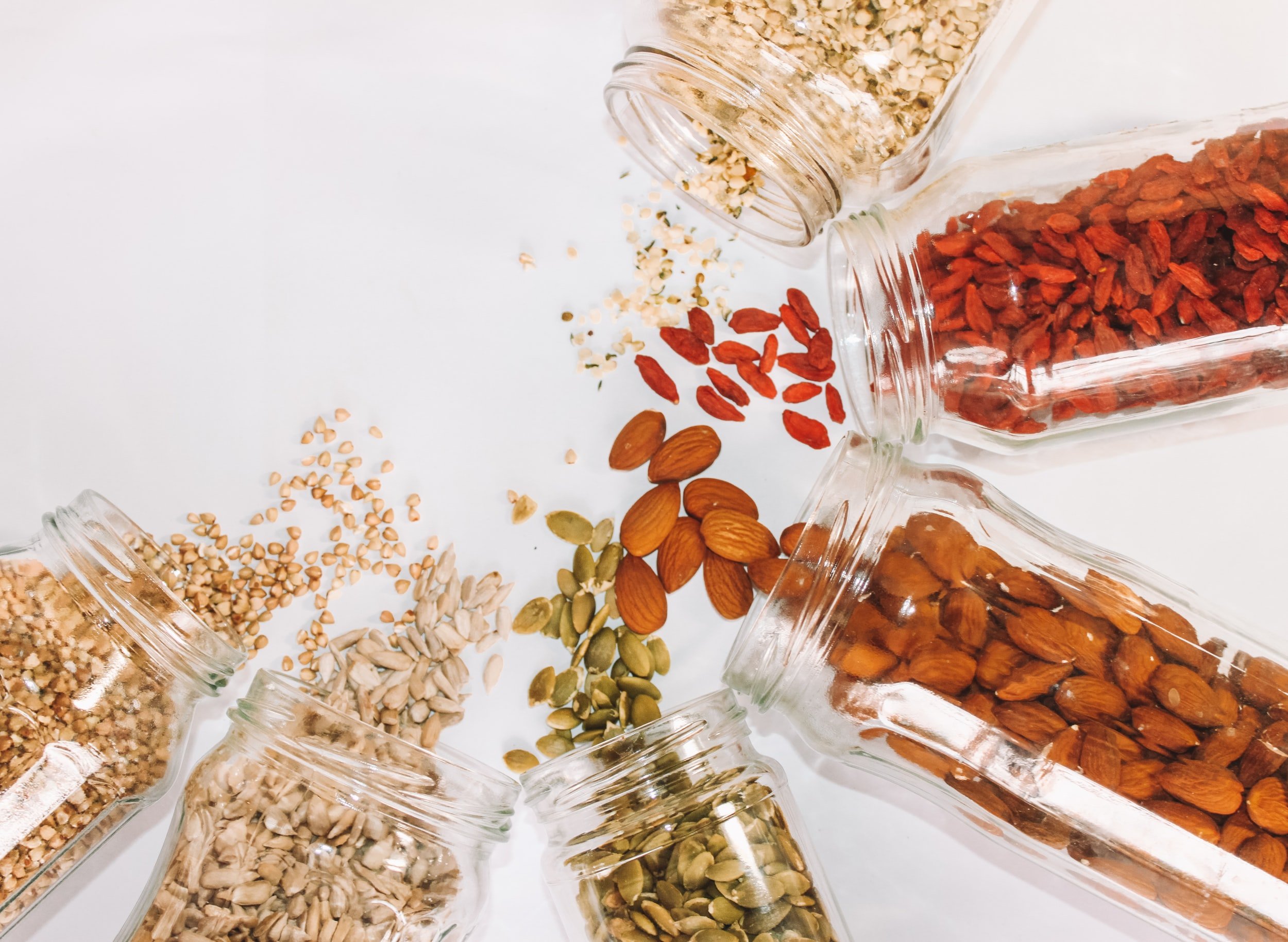Raise your hand if you love peanut butter! almonds! avocado! Ah, the wonderful world of heart healthy, dietary fats is both delicious and nutritious!
However, like carbs, there is a LOT of confusion when it comes to eating fats. Fats have acquired an unnecessarily BAD reputation; often associated as “bad foods” to avoid. Time to clear the air once and for all! Today’s blog is all about debunking this myth ‘cause it’s not true and very misleading.
First and foremost, not all FATS are created equal so they can’t all be lumped together and deemed “bad”. Secondly, you NEED heart healthy, dietary fats to maintain specific body functions and survive. Yep, that’s right! Your body literally needs and relies on dietary fats to do its job. This means when you don’t eat them, your body can’t do what it needs! But, wait! Doesn’t eating fat make you fat? NOPE! Let me say that again: eating fats does not make you gain weight or fat!
Your body doesn’t gain weight or body fat because you are eating dietary fats. Your body gains weight and body fat when you eat more calories than you are burning. It doesn’t matter whether those calories come from almonds, Oreos or broccoli.
When this happens, you are in a caloric surplus and that surplus causes weight gain and increases in body fat. And, QUALITY MATTTERS! Not all fats are created equal, so today’s blog is teaching you:
-
5 Reasons You Need Fats to Survive!
-
The Fats To Eat Daily!
-
3 Tips to Eat More Fats!
5 Reasons You Need Fats
Heart healthy, dietary fats are energy, fuel, protection, and a vitamin vehicle all rolled into one! These foods play important roles necessary for optimizing your health and keeping you alive:
-
Provides Energy: Dietary fats are the body’s secondary source of energy (carbohydrates are first).
-
Keeps You Full: Dietary fats prolong the digestive process by slowing the body’s secretions of hydrochloric acid which in turn, keeps you fuller for longer.
-
Produces Hormones: Your body needs dietary fat to produce important hormones that assist in a number of different functions in the body.
-
Regulates Temperature: Dietary fats insulate the body from environmental temperature changes and preserve body heat.
-
Absorbs Nutrients: Dietary fats are necessary in order to absorb water-soluble vitamins such as vitamins A, D, E, and K.
Fats to Eat + Fats to Avoid
Just like the other macronutrients (protein and carbohydrates), not all fats are created equal, are heart-healthy or provide you with nutritional benefits. If you want to improve your health and maximize results, it’s crucial you are eating the right types of fats (daily) while limiting the other. Pay close attention because there are two types of fats:
#1. Monounsaturated & Polyunsaturated Fats. These are the heart healthy, dietary fats you want to eat regularly because they provide a plethora of nutritional benefits. Here are some examples to get started:
-
Nuts + Seeds: almonds, cashews, pecans, walnuts, pistachios, flax, chia seeds, pumpkin seeds
-
Nut Butter: almond, cashew, peanut butters
-
Oils: coconut, hemp seed, flax seed, olive
-
Other: butter, cheese, hummus, avocado
#2. Saturated & Trans Fats. These are the fats to limit / avoid. Consuming saturated and trans fats leads to negative health effects – things like high cholesterol and increased risk of heart disease. Saturated and trans fats are found in fried foods, margarine and packaged snack foods. yes, this stuff tastes good going down but won’t do you any favors. PLus, these foods are easy to overeat and put you in that calorie surplus.
3 Tips to Eat More Fats!
Follow the below guidelines to ensure you are fueling your body and providing it with the proper servings of heart healthy, dietary fats it needs to keep you going strong!
-
Female Portions: It is recommended females eat 1 thumb-sized portion at every meal (~ 1 tablespoon)
-
Male Portions: It is recommended males eat 2 thumb-sized portions at every meal (~ 2 tablespoons)
Need some help adding more fat to your meals? Here are 3 tips to eat more heart health fats at meals and snacks:
-
Breakfast:
-
Add sliced avocado to eggs or toast
-
Add cheese to egg scramble or melt onto toast
-
Add nut butter to your yogurt, oatmeal, overnight oats, or smoothie
-
Add hemp, flax or chia seeds to smoothie, oatmeal or overnight oats
-
-
Lunch & Dinner:
-
Top off salad with a favorite fat: nuts or seeds for added crunch, olive oil for dressing, sliced avocado, hummus, or olives
-
Top off roasted veggies with sprinkled cheese, drizzled olive oil or hummus
-
Top off chili or baked potato with hummus, avocado or cheese
-
Add cashews or your favorite nut to dishes like stir-fry
-
Make an almond butter-based dressings for pad-Thai or other stir-fry dishes
-
Drizzle tahini dressing over veggies, chicken, steak, etc.
-
-
Snacks:
-
String cheese
-
Hummus with veggies
-
Avocado with veggies
-
Almonds or nut butter with Greek yogurt
-
Nuts + fruit
-
Nut butter + fruit
-

Stay Fueled

